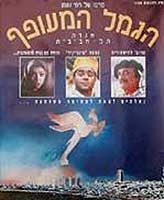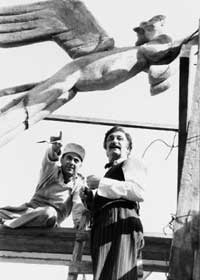 The Israeli comedy The Flying Camel () has an underlying utopian sense of what is possible with friendship, even in a world acknowledged to be full of bigotry, violence, & hate. The Israeli comedy The Flying Camel () has an underlying utopian sense of what is possible with friendship, even in a world acknowledged to be full of bigotry, violence, & hate.
Retired professor Bauman (Gideon Singer i.e., Gidon Zinger), down on his luck & very alone since the death of his wife, lives in a shack on a piece of property inherited decades before from his father. On his tented peddle-bike he explores Tel Aviv looking for thrown-out remnants of the world of the 1930s & of the "international architecture" upon which his architect father made his now-vanished reputation.
He sees the Tel Aviv of his childhood & youth knocked down by developers to be replaced with ever bigger buildings. Bauman believes beauty is being taken away from the world, all evidence of his father with it, & all he can do is bring to his junked-up property fragments of a discarded past.
Before the property was his father's, however, it belonged to Palestinians. A local garbage man, Phares (Salim Dau), has been trying to find the exact place where his own father once had an orange grove & some olive trees, at a time before a lottery system took everything away from his family to give to Jews immigrating from Europe. Phares grew up penniless in a refugee camp, but is a man devoid of bitterness.
The land he is looking for, only for nostalgic reasons, turns out to be the junked up property of Professor Bauman. Once an orange grove, now a junkyard.
Despite every reason for hostility, this Arabic man is simple & decent fellow. Professor Bauman doesn't want him hanging around, but for one reason then another they become friends.
Because the professor collects garbage & Phares is a garbage collector disinclined to judge others, he brings Bauman a truckload of recyclable stuff out of friendship. The unappreciative professor gets angry because he only collects fragments of the 1930s.
While the rebuffed gift is being reloaded into the garbage truck, the professor spots a camel's head, & recognizes it as part of a stone flying camel, a relic of the era with which he is obsessed. After their usual argumentativeness, the two men will end up on a quest to find the other pieces of the flying camel, which as it turns out Phares is qualified to reconstruct because he is "almost an engineer."
One morning the professor finds a caravan parked in his junkyard, & is immediately offended by the audacity of whatever traveller has come onto his land. It turns out to be a beautiful young sexy "almost a nun." Gina (Laurence Bouvard) has not exactly taken vows due to "something that happened." To make up for her lusty escapade she has come to Israel hoping to do something worthy of Mother Teresa.
The Moslem, the Jew & the Catholic forge a veritable family of mutual care, overlooking or crabbing about one anothers' piccadellos, but always ultimately accepting one another because each has a decent soul. The liberal dream of The Flying Camel deserves respect even if the stereotypes could be interpretted as at least partially offensive.
The erotic nun who sleeps in the nude with her ass showing from the caravan window; the subserviant Moslem who other Moslems perceive as kissing up to the Jew; & the professorial Jew. Since being a professor isn't quite as negative a stereotype as being a sexualized nun or kowtowing Arab, the director did not quite achieve the balance he well meaningly intended.
Even with its imperfections I was many times deeply moved by this little comedy. The fact that the architecture of Tel Aviv, which Bauman so adores, ranges from nondescript to outright ugly, is an underlying reality of everything that happens in the film. Even in an ugly world it is possible to see beauty. Even in a world of violent divisions it is possible to bridge the divides with natural unstrained & unabashed friendships. If only that was what modern Israel really was like!
This is one of those films which the term "heartwarming" risks trivializing. Its central symbol of the flying camel reflects a saying "when a camel flies" which in North America has the parallels "if cows could fly" or "when pigs fly," something that would be nice but which is an impossibility. The film places its characters in a homely location & for all the world's dangers & pitfalls, love & hope remain, & there is even room for a little miracle.
copyright © by Paghat the Ratgirl
|

